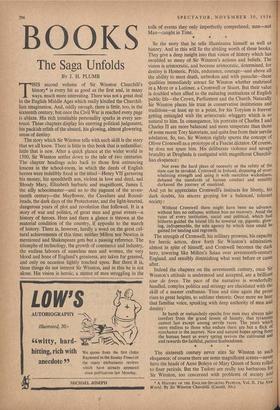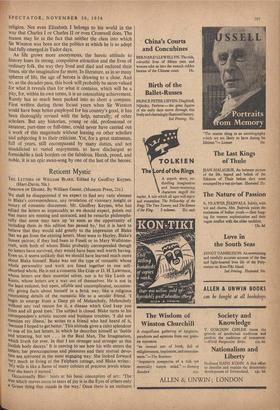BOOKS
The Saga Unfolds
BY J. H. PLUMB THIS second volume of Sir Winston Churchill's history* is every bit as good as the first and, in many ways, much more interesting. There was not a great deal in the English Middle Ages which really kindled the Churchil- lian imagination. And, oddly enough, there is little, too, in the sixteenth century, but once the Civil War is reached every page is ablaze. His rich inimitable personality sparks in every sen- tence. These chapters display his unerring political judgement, his puckish relish of the absurd, his glowing, almost glowering, sense of destiny.
The story which Sir Winston tells with such skill is the story that we all know. There is little in this book that is unfamiliar; little that is new. After a quick glance at the wider world in 1500, Sir Winston settles down to the tale of two centuries. The chapter headings echo back to those first entrancing lessons in the school-room, in which the deeds of English heroes were indelibly fixed in the mind—Henry VII garnering his money, his spendthrift son, violent in love and deed, sad Bloody Mary, Elizabeth barbaric and magnificent, James I, the silly schoolmaster—and so to the pageant of the seven- teenth century—the Mayflower, the Cavaliers and Round- heads, the dark days of the Protectorate, and the light-hearted, dangerous years of plot and revolution that followed. It is a story of war and politics, of great men and great events—a history of heroes. Here and there a glance is thrown at the material condition of the country, if apposite to the march of history. There is, however, hardly a word on the great cul- tural achievements of this time; neither Milton nor Newton is mentioned and Shakespeare gets but a passing reference. The triumphs of technology, the growth of commerce and Industry, the endless labours of nameless men and women, the very blood and bone of England's greatness, are taken for granted, and only on occasion lightly touched upon. But there it is, these things do not interest Sir Winston, and in this he is not alone. His vision is heroic, a matter of men struggling in the toils of events they only imperfectly comprehend; men—not Man—caught in Time.
* * So the story that he tells illuminates himself as well as history. And in this will lie the abiding worth of these books. They give a deep insight into that vision of history which has moulded so many of Sir Winston's actions and beliefs. The vision is aristocratic, and because aristocratic, determined, for destiny is Homeric. Pride, endurance, courage—and above all the ability to meet death, unbroken and with panache—these qualities immediately attract Sir Winston whether enshrined in a More or a Latimer, a Cromwell or Stuart. But their value is doubled when allied to the enduring institutions of English public life—the Crown, Parliament and the Church. Naturally Sir Winston places his trust in conservative institutions and traditions—at least up to a point, for his Toryism is forever getting entangled with the aristocratic whiggery which is so natural to him. In consequence, his portraits of Charles I and Charles II are more balanced and more temperate than those of some recent Tory historians, and quite free from their servile adulation. So, too, Sir Winston rightly spurns the concept of Oliver Cromwell as a prototype of a Fascist dictator. Of course, he does not spare him. His deliberate violence and savage brutality at Drogheda is castigated with magnificent Churchil- lian eloquence:
Not even the hard pleas of necessity or the safety of the state can be invoked. Cromwell in Ireland, disposing of over- whelming strength and using it with merciless wickedness. debased the standards of human conduct and sensibly darkened the journey of mankind.
And yet he appreciates Cromwell's instincts for liberty, his dark doubts, his sincere groping for a balanced, tolerant society :
Without Cromwell there might have been no advance, without him no collapse, without him no recovery. Amid the ruins of every institution, social and political, which bad hitherto guided the Island life he towered up, gigantic, glow- ing, indispensable, the sole agency by which time could be gained for healing and regrowth.
The strength of Cromwell, his military prowess, his capacity for heroic action, draw forth Sir Winston's admiration, almost in spite of himself, and Cromwell becomes the dark hero, towering like Milton's Satan over seventeenth-century England. and sensibly diminishing what went before or came after.
Indeed the chapters on the seventeenth century, once Sir Winston's attitude is understood and accepted, are a brilliant tour de force. The pace of the narrative is wonderfully handled, complex politics and strategy are elucidated with the skill of a master craftsman. Time and time again the prose rises to great heights, to sublime rhetoric. Once more we heat that familiar voice, speaking with deep authority of men and destiny : In harsh or melancholy epochs free men may always take
comfort from the grand lesson of history, that tyrannies cannot last except among servile races. The years which seem endless to those who endure them are but a flick of mischance in the journey. New and natural hopes spring from the human heart as every spring revives the cultivated soil and rewards the faithful, patient husbandmen.
The sixteenth century never stirs Sir Winston to such eloquence; of course there are some magnificent scenes—never have the heads of Anne Boleyn or Mary Queen of Scots rolled to finer periods. But the Tudors are really too barbarous for Sir Winston, too concerned with problems of society and * A HISTORY OF THE ENGLISH-SPEAKING PEOPLES, VOI. 11. The Nov World. By Sir Winston Churchill. (Cassell, 30s.) religion. Not even Elizabeth I belongs to his world in the way that Charles 1 or Charles II or even Cromwell does. The reason may lie in the fact that neither the class into which Sir Winston was born nor the politics at which he is so adept had fully emerged in Tudor days.
As life grows more anonymous. the heroic attitude to history loses its strong, compulsive attraction and the lives of ordinary folk, the way they lived and died and endured their times, stir the imagination far more. In literature, as in so many spheres of life, the age of heroes is drawing to a close. And so, as the decades pass, this book will probably be more valued for what it reveals than for what it contains, which will be a pity, for, within its own terms, it is an astonishing achievement. Rarely has so much been packed into so short a compass. First written during those locust years when Sir Winston could have bee)n better employed for his country's good, it has been thoroughly revised with the help, naturally, of other scholars. But any historian, young or old, professional or amateur, part-time or full-time, could never have carried out a work of this magnitude without leaning on other scholars and subjecting it to their criticism. Yet, for a great statesman, full of years, still encompassed by many duties, and not unaddicted to varied enjoyments, to have discharged so formidable a task borders on the fabulous. Harsh, proud, and noble, it is an epic swan-song by one of the last of the heroes.



















































 Previous page
Previous page